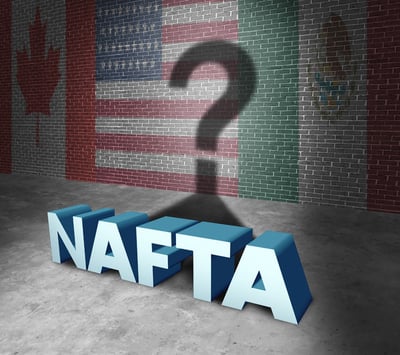NAFTA Certificates Are More Than Just a Document: The Impact of Non-Compliance
*USMCA/CUSMA replaced NAFTA on July 1st, 2020. Read More...
The North American Free Trade Agreement (NAFTA) has been in place for over 20 years. It allows importers to benefit from duty free rates when goods are traded between Canada, Mexico and the United States. The agreement is somewhat convoluted though, and often companies do not fully understand the multi-layered complexities of Free Trade Agreements.
A NAFTA certificate of origin is more than a shipping document, it is a legal document and therefore, it has legal consequences. In the U.S., the burden of Customs compliance was shifted to importers in 1994, when Congress passed the Customs Modernization Act or “Mod Act,” as part of the same legislative package as NAFTA. Because of this the importer is held liable in cases of non-compliance. In Canada, the Customs Act places the burden on both the importer and owner of goods to pay the duties and comply with any provision concerning the preferential tariff treatment.
When you import goods the cost of transportation, duty and any applicable taxes helps determine the final sale price. But what if you had to pay additional duties ranging from 2-25% of the value of the product that were not included in your cost of sales? That would have a serious impact on your bottom line. It can happen if a customs audit determines that the goods do not qualify under NAFTA. To avoid this you need to be sure that your NAFTA certificates are completed correctly and according to regulations.

Helpful Tips to Consider
Training
Designating a specific qualified individual to manage import compliance for your company can help reduce confusion and mistakes. Make sure to write out the procedure covering all aspects of your import compliance program. Then conduct regular training to keep abreast of updates is recommended.
Be Specific
You must be specific about what products you are importing on all paperwork. The description should be clear and detailed enough to identify the merchandise included in the shipment. This will make it easier for border authorities to keep track of your documentation.
Classification
When you import products the responsibility of classifying products properly is on you. You have to make sure that the product is listed under the correct HS code. Accidentally picking the wrong classification can cost you and your business both financially and in Customs’ standings.
If you have any questions or problems when completing your NAFTA certificates, you should consult an expert. Failure to properly complete the NAFTA certificate may result in higher scrutiny from customs officials, meaning delays, possible audits and decreased profits.
Does the product qualify?
Unfortunately, products do not automatically qualify for the NAFTA duty rate just because they are manufactured in a NAFTA country or purchased from a NAFTA country. Many products that are manufactured in NAFTA countries do not meet the rules of origin and therefore they do not qualify. There are steps you can take to help determine if a product qualifies.
- The first step is to determine the correct HS Tariff Classification for the finished product.
- Then refer to the NAFTA agreement to identify the NAFTA rule of origin. Each classification has its own specific NAFTA rule, based on a tariff shift, a regional value content or both.
- Once the specific rule is determined, the bill of material must be examined and all items on the list must also be assigned a tariff classification and note the country of origin in which they were manufactured.
- Finally, the bill of material information must be verified against the specific rule of origin for the finished product, in order to determine if the finished product qualifies for NAFTA.
- The NAFTA certificate should only be completed after a thorough verification to determine if the goods qualify.
The NAFTA rules of origin are complex and can prove difficult to understand without extensive knowledge of the agreement. Taking advantage of the benefits offered by the NAFTA agreement means that you must understand and follow the rules or suffer the consequences of non-compliance. No company wants to deal with extended delays, audits and additional costs. When importing goods you have to consider many factors, and since the burden of compliance is on you, it is imperative to be thorough.
Companies often rely on free trade specialists to verify qualification and insure compliance. Our Customs Consulting team is an invaluable resource with deep and up-to-date knowledge surrounding complex NAFTA issues. We're here to guide you through the convoluted, multi-layered complexities of the NAFTA and a growing number of other Free Trade Agreements.

